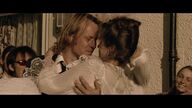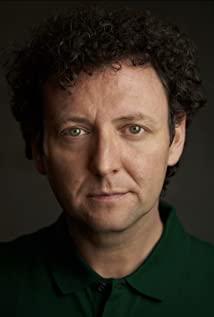Speaking of Lagrange's movies, many people probably think of the first "Dancer in the Dark" that made people look good, but because of the emotional depression after watching it, they were reluctant to watch "Dancer in the Dark" the second time. In my opinion, "Out of the Waves" filmed earlier than "Dancer in the Dark" also has this feeling, and even the two films have many similarities, which can be said to be in the same line. Like the "Black" film, in "Out of the Waves", the director designed a character like Selma dancing in the dark-Beth. She is also an ordinary woman with some "problems" and the same Her own spiritual sustenance, she is also rich in sacrifice, and she is also inadvertently and unconsciously entering a tragic ending.
Tragedy often requires a happy and lively setting. What Laplace uses here is a love and a lively wedding, which is reminiscent of the movie "Deer Hunter", which also symbolizes happiness. The wedding begins. Beth's wedding is not grand, but very lively. She loves to bond with Jane, a stranger, and she can't help smirking in happiness. However, in this happy wedding, the director has planted the foreshadowing of the future plot turn. From the beginning of the film, it shows that Beth lives in a conservative town, where people are very religious, clergymen and squires. It seems that people of high morals have the right to speak. But Beth's love is not recognized, and her marriage is not blessed, so a repressive weird atmosphere can be seen in her wedding. In fact, marriage is often a turning point in life, and we often wish the two people who enter this turning point of life to be happy, hoping that they will turn to a better side of life, and whether it is realistic or literary works, there are too many in film and television works. Many examples show that marriages, especially marriages that start in a repressive atmosphere, often lead to a mess of life. The director then gradually began the turning point of Beth's life step by step.
First of all, after Beth and Jane’s frantic sex and happily looking at each other again and again, they briefly left home for a long time to work at offshore oil wells. For the newlyweds, what could be worse than separation? During the separation, Beth's repeated hysterical performance revealed her mental problems. There is a fragile hysterical role in love. Can such love make people feel stable? What's more, this was also the basis for Beth's more "ridiculous" behavior. Next, Beth prayed for her husband's return. What an infatuation, her prayer to God did indeed get her husband's return, but her husband was paralyzed after a work accident. Next, Beth's husband made a strange move. He asked Beth to have sex with other men and then came back to tell him. He told Beth that if she didn't do this, he would die. It may not be taken seriously by other people, but Beth, this somewhat neurotic woman takes it seriously, and Jane obviously came to the truth instead of testing Beth, so a "farce" was staged, yes, in the original play I think it’s a ridiculous farce performed by Jane and Beth together with other characters in, as well as those in front of the screen. If the doctor in the play asks Beth, Jane’s "perversion" makes Beth. "Sex with the world".
Beth has her spiritual world. She often prays and imitates the voice of God to talk to herself. She has doubts about the God declared by the elders of the town. She only believes in the God in her heart. Therefore, Beth's belief is somewhat self-deceiving, but in the face of sudden suffering, this is her sustenance for refuge and the driving force for her courage to move forward. So, she dressed up as a prostitute and had sex with strangers. She ignored Jane's unstable condition and always regarded Jane's temporary illness as a miracle of her having sex with strangers. Therefore, she hoped that Jian Hao would be faster, and she needed a bigger miracle. She came to the ship in spite of the danger. Faced with the cruel owner and sailor, she was once afraid, but finally went into danger for her lover. Finally, when she found out that Jane's condition had not improved when she was dying, she had to admit that she was wrong, she bowed her head to reality, she also lost the hope of living, and died pitifully. And the greatest miracle and greatest tragedy happened in this way. Jane really got better, not only ran away from death, but also stood up again. At this time, Beth had already left with despair. When she finally gave up her faith and failed to see When the miracle happened, it was undoubtedly her great tragedy.
Like "Dancer in the Dark", the director did not direct a heart-piercing or horrible tragedy, but quietly promoted the process. The shooting was still shot in a documentary-like way, so the lens was very realistic, but it did not have the strong sense of shaking as in the later "Black" film. In the same way, there is no such absolute evil person in this film, no object that allows us to vent our anger and dissatisfaction while we are sad, such as Beth's cold-looking mother, but also sad in the end, so I can't bear to blame it anymore. She; and because there was no naked display of the last atrocities of the sailors on the ship, I couldn't let me hate them; and the conservative elders, the priests also looked pedantic and indifferent, but it was hard to hate me. In fact, Beth has been taken care of by many kind people, making this tragedy seem natural and unbelievable. It seems to be revealed to us in Lars von Trier's movies. The "murder" in daily life, those indifferent people, those narrow ideas, and those humble little evils may gradually lead to regrettable results. Lars von Trier is torturing the conscience of the audience through the film, allowing people to reflect on the possible evil factors in a peaceful life. It is no wonder that "Out of the Waves" and his "Idiots" and "Dancers in the Darkness" both claim As the "Trilogy of Conscience."
Russ von Trier also repeatedly reveals the theme of "faith", so although his films appear very dark, they always flash the hope of faith. Beth has a pious belief in love, and because of this, for love, this weak woman is willing to work hard for the survival of her lover regardless of danger. Therefore, at the end of the film, the person in the play understands what she does, understands a woman's sincere belief, and believes that the audience also understands her and understands the pure belief of this pious girl. At the end of the film, the director presented a surrealistic ending. Jane stole Beth's body and sank her body into the sea. The next day, Jane and the workers heard the distant bells and raised their heads. , They found that it was the clock of heaven swaying, and Beth finally broke the waves and went out to ring the clock of heaven, piercing the sky, making people smile.
http://handsomewang.blogdriver.com/handsomewang/1244216.html
View more about Breaking the Waves reviews











